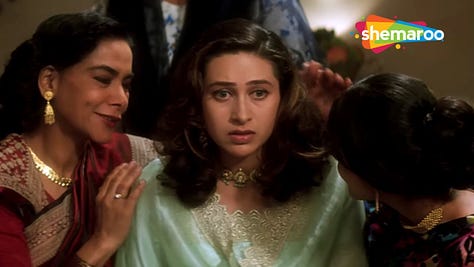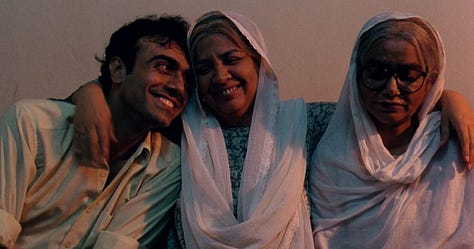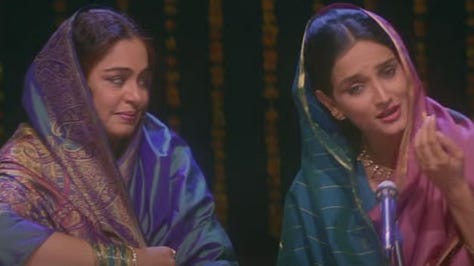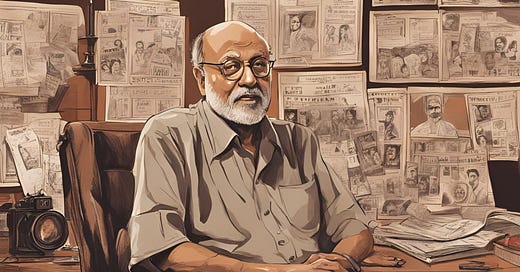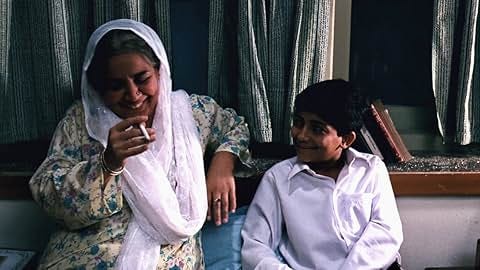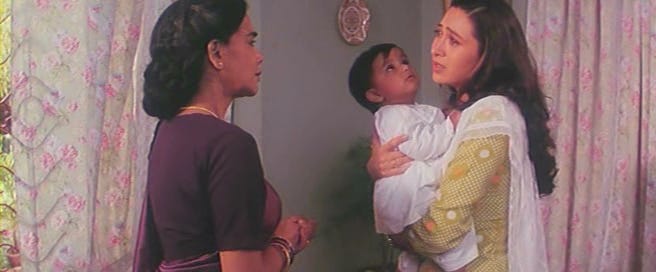There is a point in Zubeidaa where Karisma Kapoor’s titular character has a temper tantrum and knocks over the table while having lunch with her husband Victor (Manoj Bajpayee) over an argument that’s not entirely logical. She comes across as immature and stubborn, a woman-child, if you will. It’s not often that mainstream Bollywood movies expect the audience to disagree with the protagonist. But this isn’t one of those films.
Zubeidaa (2001) was the last of a loosely strung trilogy by Shyam Benegal that included Sardari Begum (1996) and Mammo (1994). The plots of all three films are unconnected but share some thematic similarities.
All three feature Muslim women as protagonists. Zubeidaa is a semi-autobiographical story written by Khalid Mohammed about his own mother who worked briefly as an actress before marrying into a rajput royal family. Mammo is a childless widow who slips through the cracks in the fraught, corrupt and confusing post-partition years. Sardari Begum is the story of a woman who runs away from home to pursue a taboo career as a Thumri singer.
They appear in a similar era - from the chaotic wake of the partition and through to the impatient and seemingly modern 90s. All three women are forgotten footnotes in history, excavated by someone from the next generation through fragmented anecdotes. Zubeidaa’s son Rizwan, a film journalist, is trying to understand his absentee mother and find the lost reels of her brief movie career. Mammo’s nephew, Riyaz, has written a book about her, in hopes of finding her. And Sardari’s story is retraced by her journalist niece.There’s something telling about this structure of storytelling - that these women were so ahead of their times that while their own generation rejected them, the next one would see them with more kindness and empathy.
I saw Zubeidaa when I was probably too young for it. Before this, my movie diet consisted mainly of the few big films of the year and then whatever played on Zee Cinema and Set Max when I came back from school. It’s safe to say that I had never seen women characters like these. Most women in the movies I saw back then were either silly props or fleeting support characters in the stories of men. Even when they had their own stories, it was imperative for them to be faultless. Brave, strong, unshakeable women of virtue. Both robbed women of their humanness. I’ve written previously, how the OTT-powered Strong Women™ trope creates its own pressures on women in our modern patriarchy-smashing times, so this is clearly a pet peeve of mine.
But stories like Zubeidaa’s brought alive, real, flawed women who played skip rope with their shackles. Their rebellion was not heavy or even purposeful. Their recklessness was not born from an ideological stance. Through Shyam Benegal’s lens, I saw women who weren’t deliberate heroines setting out to do anything extraordinary. They merely went about their somewhat naive, reckless lives driven by an internal compass that only ever made sense to them. They were strong, independent, yes. These women were individualistic too. But there was no pretending that their (and other women’s) lives were not impacted by seismic cultural shifts. Muslim marriage laws, partition, Rajputana royal customs and so many other things carried them one way or another, often against their will. But their strength or survival instinct was not a choice but an inevitability.
In the era that these films were made, womanhood and motherhood overlapped almost entirely. But in this trilogy, ideas of motherhood land more tentatively. Both Zubeidaa and Sardari are mothers, biologically but not defined by their motherhood. One leaves her child behind in order to remarry, while the other overshadows her daughter. On the other hand, Mammo is childless, but is a devoted motherfigure to her nephew.
With Shyam Benegal’s passing this week, I thought about how he changed the way I processed characters I saw and read. I may have chanced upon Zubeidaa, but I sought out Sardari Begum and Mammo. In college, I would watch Mandi (1983) and much later, Bhumika (1977). It imbued in me a love for characters who have the luxury of being human. Later, I would go on to read The God of Small Things by Arundhati Roy and would see shades of Zubeida and Sardari in Ammu as well.
When male characters are flawed, their flaws are supposed to be endearing or admirable. Flawed women, on the other hand, we hardly know what to do with. These women were neither celebrated or berated. They were too unique and specific to be cautionary tales. The character arcs didn’t look for redemption. Their actions didn’t seek the audience’s approval or validation. It’s a brave thing to do in popular cinema.
With Shyam Benegal’s passing, we also mourn the passing of his unique lens and the empathy with which he told these stories. Each of these showed me characters that one could love, without feeling any reason to like. And isn’t that irrationality what being human is about?
